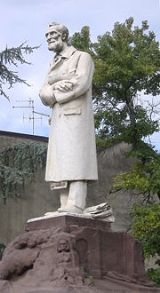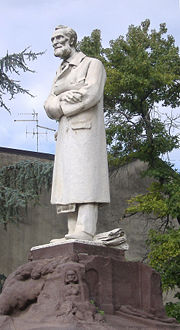
Paolo Gorini
Encyclopedia

Italian people
The Italian people are an ethnic group that share a common Italian culture, ancestry and speak the Italian language as a mother tongue. Within Italy, Italians are defined by citizenship, regardless of ancestry or country of residence , and are distinguished from people...
scientist.
Biography
Born in PaviaPavia
Pavia , the ancient Ticinum, is a town and comune of south-western Lombardy, northern Italy, 35 km south of Milan on the lower Ticino river near its confluence with the Po. It is the capital of the province of Pavia. It has a population of c. 71,000...
, he moved to Lodi in 1834 as physics lecturer in the local Lyceum. Here he achieved noteworthy discoveries about organic
Organic compound
An organic compound is any member of a large class of gaseous, liquid, or solid chemical compounds whose molecules contain carbon. For historical reasons discussed below, a few types of carbon-containing compounds such as carbides, carbonates, simple oxides of carbon, and cyanides, as well as the...
substances.
After the Five Days of Milan
Five Days of Milan
The Five Days of Milan was a major event in the Revolutionary Year of 1848 and the start of the First Italian War of Independence. On March 18th, the city of Milan, rose, and in five days of street fighting drove Marshal Radetzky and his men from the city....
, he had to flee to Switzerland
Switzerland
Switzerland name of one of the Swiss cantons. ; ; ; or ), in its full name the Swiss Confederation , is a federal republic consisting of 26 cantons, with Bern as the seat of the federal authorities. The country is situated in Western Europe,Or Central Europe depending on the definition....
, where he continued his studies in geology
Geology
Geology is the science comprising the study of solid Earth, the rocks of which it is composed, and the processes by which it evolves. Geology gives insight into the history of the Earth, as it provides the primary evidence for plate tectonics, the evolutionary history of life, and past climates...
. Back in Lodi, in 1871 he published Sull'origine del vulcani ("On the Origin of Volcanoes") and in 1872 he became famous for the embalming
Embalming
Embalming, in most modern cultures, is the art and science of temporarily preserving human remains to forestall decomposition and to make them suitable for public display at a funeral. The three goals of embalming are thus sanitization, presentation and preservation of a corpse to achieve this...
of the bodies of Giuseppe Mazzini
Giuseppe Mazzini
Giuseppe Mazzini , nicknamed Soul of Italy, was an Italian politician, journalist and activist for the unification of Italy. His efforts helped bring about the independent and unified Italy in place of the several separate states, many dominated by foreign powers, that existed until the 19th century...
and Giuseppe Rovani
Giuseppe Rovani
Giuseppe Rovani was an Italian novelist.Rovani was born in Milan. He was known for criticism of historical novels of the Romantic style, which were popular in Italy at the time and whose stereotypes and old fashioned plots he pointed out...
.
A monument and a museum are dedicated to him in Lodi.

